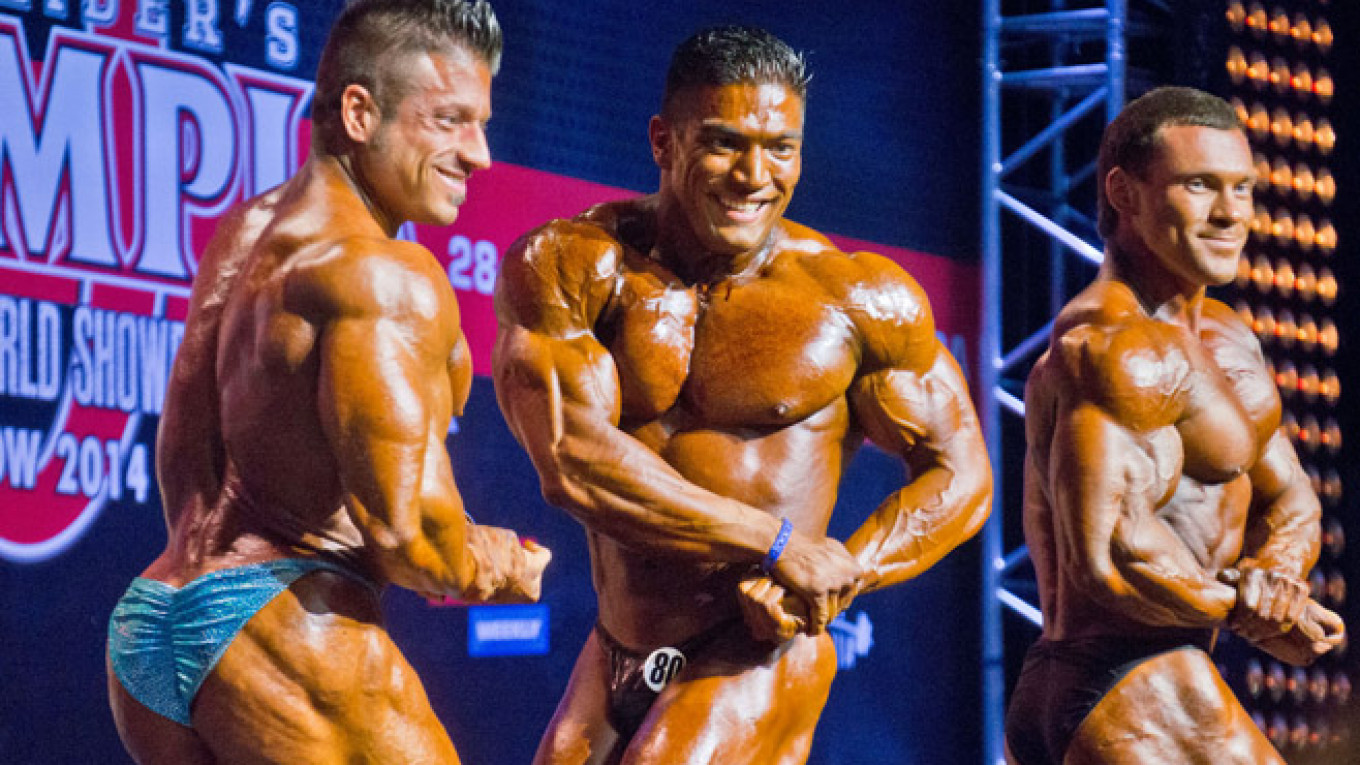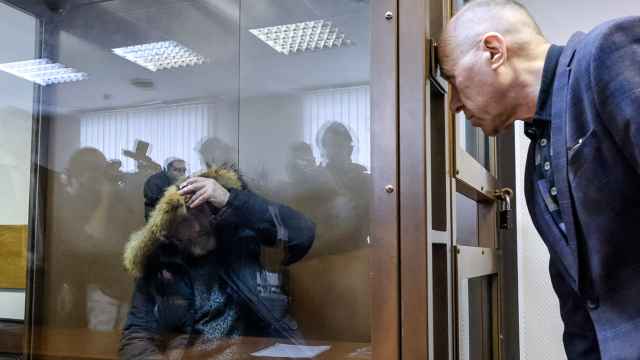Bulging biceps and protruding veins straining inside tight muscle shirts emblazoned with U.S. stars and stripes were abundant over the weekend at Moscow's Power Pro Show, Russia's largest international bodybuilding and fitness exposition.
Muscular men and women oiled up, their skin glistening like oven-roasted chicken breasts, donned skimpy polyester attire, bared rows of unnaturally white teeth — and flexed for all they were worth. Scores of bodybuilding enthusiasts indadvertedly nudged each other with their bulky arms as they sampled protein shakes and energy bars.
Bodybuilding is a relatively new pastime in Russia. It gained popularity in the later years of the Soviet Union, when perestroika and glasnost paved the way for more openness toward the West. But the development of this imported hobby is now being jeopardized by Russia's scuffles with the West.
All-American Attraction
The birth of bodybuilding in Russia can be traced back to the tsarist era, according to the event's organizers, with the 1885 foundation of the St. Petersburg Amateur Weightlifting Society by physician Vladislav Krayevsky. The discipline was practiced in the Soviet Union, but it was not supported by the state.
In 1962, Leningrad — modern-day St. Petersburg — became home to the country's first official bodybuilding club. In the next two decades, the sport would gain popularity though unofficial championships.
But the sport only gained mass interest in the 1980s, as VCRs trickled into the Soviet Union. American action movies such as the "Rambo" series and "The Terminator" — featuring the rippling torsos of Sylvester Stallone and Arnold Schwarzenegger — were a roaring success.
The mighty muscles of American movie stars precipitated the creation of a national athletics federation in 1987, the predecessor of Russia's modern-day Bodybuilding and Fitness Federation. The Soviet Union first competed in the sport on the international stage in 1988 at the World Amateur Bodybuilding Championships in Australia, its team finishing 18th in the competition. Russian athletes have since known success in the discipline, including Denis Gusev, the first Russian — and European — to be included in the top three of the "men's physique" category in a U.S. professional championship.
U.S. Domination
Although the president of the International Federation of Bodybuilding and Fitness, Rafael Santonja, insists that Russia has one of the "most powerful" bodybuilding federations, observers have decried the country's average performance compared with other bodybuilding powerhouses, including the United States.
"Why do Americans always win? Why is the U.S. in a league of its own?" inquired a Russian journalist at a press conference organized by Moscow's Power Pro Show on Saturday.
Russia and the U.S. have flexed their muscles on the political stage on a number of occasions this year, but it is no secret that the U.S. has largely dominated Russia in bodybuilding.
"We have a great tradition of bodybuilding in the United States," said Phil Heath, a four-time winner of the "Mr. Olympia" bodybuilding title. "The sport is accepted. I am here [in Moscow] today to work with Russian bodybuilders and to make sure that the sport expands here."
Sanctioned Supplements
Limited access to training facilities and sports nutrition products are some of the obstacles aspiring bodybuilders face here.
A gym membership in Russia generally costs between 1,000 rubles ($20) and 7,000 rubles ($140) a month. Bodybuilding hopefuls can sometimes cover the costs of training in smaller cities, where facilities are less costly but not necessarily of the highest quality. But the cost of training can sometimes represent nearly one quarter of the national average monthly salary of 30,000 rubles ($600).
And Russia's standoff with the West over the crisis in Ukraine is also jeopardizing Russian athletes' ability to purchase sports nutrition products.
In early August, the government banned the import of a number of Western food products, including nutritional supplements. The decision sent shockwaves through the country's athletic community, which is heavily reliant on foreign imported sports nutrition products.
Although the ban on the import of Western nutritional supplements was lifted two weeks later, Russian representatives of foreign sports nutrition companies insist that issues in supplying the country's athletes remain.
"They [authorities] are saying that everything has been solved, that there are no problems," said Mikhail Popov, a consultant with an American sports nutrition company. "But this is not the case. The ban on the import of substances contained in our products might have been lifted, but our orders are still stuck at the border."
The situation has resulted in the decrease of customer orders and in the loss of significant earnings for the company. Russian clients have just started receiving their first orders since the ban was canceled in late August, according to Popov.
"There are a handful of Russian companies that make similar products," Popov said. "I can think of two off the top of my head. But people want the foreign products."
This is why Heath — an American bodybuilder nicknamed "The Gift" — is bringing his line of sports nutrition known as "Gifted Nutrition" to Russia next spring.
"Russia is a very large market," Heath told The Moscow Times on Saturday. "Everyone wants to know what Mr. Olympia takes."
Contact the author at [email protected]
A Message from The Moscow Times:
Dear readers,
We are facing unprecedented challenges. Russia's Prosecutor General's Office has designated The Moscow Times as an "undesirable" organization, criminalizing our work and putting our staff at risk of prosecution. This follows our earlier unjust labeling as a "foreign agent."
These actions are direct attempts to silence independent journalism in Russia. The authorities claim our work "discredits the decisions of the Russian leadership." We see things differently: we strive to provide accurate, unbiased reporting on Russia.
We, the journalists of The Moscow Times, refuse to be silenced. But to continue our work, we need your help.
Your support, no matter how small, makes a world of difference. If you can, please support us monthly starting from just $2. It's quick to set up, and every contribution makes a significant impact.
By supporting The Moscow Times, you're defending open, independent journalism in the face of repression. Thank you for standing with us.
Remind me later.






